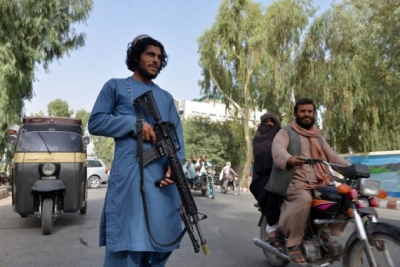

A Taliban guard at a security checkpoint in Kandahar city, Afghanistan in 2021. (Photo: Sanaullah Seiam/Xinhua/IANS)
Afghanistan’s southern city of Kandahar is the historical birthplace and the political base of the Taliban. Now, the country’s second-largest city appears to be becoming the de facto capital under the militant groups rule, according to a media report.
Several officials have recently been transferred from capital Kabul to Kandahar. Taliban’s supreme leader Mullah Haibatullah Akhundzada lives in the city and rarely leaves the Pashtun heartland in southern Afghanistan, RFE/RL reported.
Experts say Akhundzada’s decision to relocate the offices of two Taliban spokesmen to Kandahar is part of efforts to tighten his grip on power. The move comes amid growing reports of infighting between key Taliban ministers based in Kabul and a powerful group of clerics led by Akhundzada in Kandahar.
“It looks like political power is being transferred from Kabul to Kandahar,” Sami Yousafzai, a veteran Afghan journalist and commentator said, RFE/RL reported, adding, “[Akhundzada] is creating a parallel administration to the one in Kabul.”
In recent months, senior Taliban officials have appeared to criticise Akhundzada, accusing him of monopolising power and empowering ultraconservative clerics who share his extremist views.
Akhundzada, a hard-line cleric and former chief justice, has the ultimate say on all important matters under the Taliban’s clerical system.
After the Taliban seized power in 2021, ministers carried out the day-to-day administration of the Taliban government. But in recent months, Akhundzada has sought to micromanage the affairs of the state, said Yousufzai, RFE/RL reported.
Zabihullah Mujahid, the Taliban’s chief spokesman, relocated his office from Kabul to Kandahar on April 6, according to Abdul Mateen Qani, a spokesman for the Ministry of Information and Culture.
Innamullah Samangani, another key government spokesman and head of the Taliban’s Media and Information Centre, was also recently transferred to Kandahar, RFE/RL reported.
Andrew Watkins, a senior Afghanistan expert at United States Institute of Peace, a think-tank in Washington, said Mujahid’s transfer is one of the most public signs of a trend in which Akhundzada appears to be strengthening his influence.
Watkins said Akhundzada wants control over “public messaging,” which he says has “long been a priority for the Taliban”, RFE/RL reported.
Taiwan's military is prioritising combat readiness as a key aspect of deterrence due to escalating…
Calling for an increase in the speed of development, Prime Minister Narendra Modi said on…
The Scottish Government has reaffirmed its commitment to supporting religious freedom and human rights for…
Tara Chand Baloch, the President of the Baloch American Congress and a former Cabinet minister…
In a groundbreaking study, researchers from McGill University have identified nine biological markers in the…
India, in a firm and unequivocal statement at the United Nations Security Council (UNSC), accused…